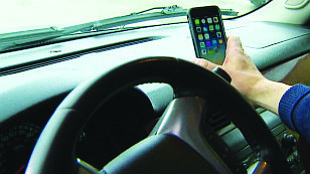Did Girlfriend's Texts Push Teen to Take His Own Life?
CNN/Stylemagazine.com Newswire | 6/7/2017, 9:05 a.m.
By Brandon Griggs, Ray Sanchez and Natisha Lance
CNN
TAUNTON, Massachusetts (CNN) -- On the last day of Conrad Roy III's young life, the text messages popped up on his phone, one after another.
"You need to do it, Conrad."
"You can't think about it, you just have to do it."
"Are you going to do it today?"
The sender of the messages, authorities say, was his 17-year-old girlfriend, Michelle Carter. The "it" was suicide.
Prosecutors argue that the texts are overwhelming evidence that while Carter played the role of a loving girlfriend, she was secretly urging Roy to kill himself. The next day, in July 2014, Roy's body was found slumped in his black Ford F-150, dead from carbon monoxide poisoning. He was 18.
Carter, now 20, is on trial this week on involuntary manslaughter charges.
When Roy had second thoughts, she told him to get back in the truck and listened on the phone while he cried out in pain and took his last breaths as his pickup truck filled with the deadly gas, Assistant District Attorney Maryclare Flynn said Tuesday.
"She mocked him when he chose to delay his death," Flynn said in her opening statement before Bristol County Juvenile Court Judge Lawrence Moniz, who will decide the case. "She put him in the car that night."
Suicide, not homicide, defense says
But Carter's attorney, Joseph Cataldo, painted a starkly different version of events, describing Roy as deeply depressed over the divorce of his parents and a victim of physical and emotional abuse who was on a "path to take his own life for years."
"This is a suicide case," he said, "not a homicide."
Cataldo noted the young's man extensive online searches about suicide methods, Carter's attempts to get him to seek help and her own bouts with mental issues.
"It was his choice," Cataldo told the judge in his opening statement.
"She didn't cause his death."
A groundbreaking case?
Is it a crime to tell someone to commit suicide?
Boston defense attorney Peter Elikann told CNN affiliate WFXT that lawyers and legal scholars are watching the trial closely because it could set a legal precedent.
"At the moment, there's really no law on the books in Massachusetts about whether somebody can encourage somebody to commit suicide or not," he said.
Carter, now 20, is being tried as a youthful offender because she was a minor when her alleged crime took place. She waived her right to a jury trial, meaning her case will be decided by Judge Moniz, who will render a verdict after testimony is over.
Asked whether Carter will testify, Cataldo said "no comment."
Roy's death
Roy was found dead July 13, 2014, in his truck in a Kmart parking lot in Fairhaven, nearly 40 miles from his home.
He was wearing a blue T-shirt, shorts and sunglasses, a since-retired Fairhaven police officer testified Tuesday as Roy's relatives wept softly in the courtroom.
A cell phone was found in the waistband of his shorts. A gasoline engine was in the back seat. It was no longer running.
The day before, authorities say, Carter had urged him to go through with his plan to commit suicide.
"You're ready and prepared. All you have to do is turn the generator on and you will be free and happy," she wrote, according to a document disseminated by the Bristol County District Attorney's Office.
"No more pushing it off," she allegedly wrote. "No more waiting."
'He seemed fine'
Conrad was a troubled youth who had tried to kill himself in 2012 by overdosing on Tylenol, his mother testified.
But after he began taking medication and went to counseling, he seemed much better, Lynn Roy said. He graduated from high school in 2014 and was making plans for the future, she said.
Her son never talked about Carter and she rarely saw them together, she said.
On the day he died, she went to the beach with Conrad and his sisters, Roy testified. He was laughing and joking about other people on the beach.
"He seemed fine," she said, although under cross-examination she added that her son later seemed "preoccupied."
'You fall asleep and die'
In the months following Roy's death, Carter posted tributes to him on Facebook, calling him her "angel." She also organized a charity softball tournament and raised $2,300 money for mental health awareness in his honor.
But Carter insisted on holding the event in another town miles from Roy's friends and family, said Tom Gammell, who described himself as Roy's best friend.
When he questioned her on the location of the tournament, she became upset and "wanted to make clear that she was getting credit" for organizing the event, Gammell testified Tuesday.
He said he had never heard Michelle Carter's name before Roy's death.
As police investigated the death, they found hundreds of text messages between Carter and Roy. In one, Carter allegedly counseled Roy on exactly how to commit suicide using carbon monoxide.
"If you emit 3200 ppm of (carbon monoxide) for five or ten minutes you will die within a half hour," she reportedly wrote. "You lose consciousness with no pain. You fall asleep and die."
Carter was indicted in February 2015. Her trial was delayed earlier this year at the request of the defense. Youthful offenders are tried in juvenile court, but the proceedings are public.
Natisha Lane reported from Taunton. CNN's Sarah Jorgensen and Dominique Debucquoy-Dodley contributed to this report.




